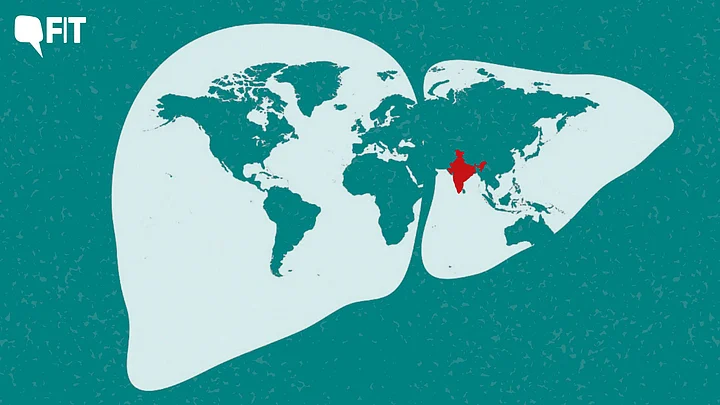India has the second-highest caseload of hepatitis B and C after China, according to a new report released by the World Health Organisation (WHO) on 9 April.
According to the report – a first of its kind – globally, the number of lives lost due to viral hepatitis is also increasing.
"This is a wake-up call for us," says Dr Neelam Mohan, Senior Director and HOD, Liver Transplant, Medanta, Gurugram, speaking to FIT.
"If you exclude COVID, in that year (2022), hepatitis was one of the leading causes of death from infectious diseases."Dr Neelam Mohan
Why does India have such a high incidence of viral hepatitis despite there being a vaccine for it? How is it contracted? How can you protect yourself?
FIT breaks it down for you.
Big numbers from the report: According to the WHO's global report, in 2022,
There were 3.5 crore registered active infections of hepatitis in India, accounting for 11.6 percent of the total disease burden in the world that year.
Of these, 2.98 crore cases were of hepatitis B and 55 lakh cases were of hepatitis C.
The estimated number of deaths from hepatitis went up from 1.1 million in 2019 to 1.3 million in 2022.
An estimated 3,500 people die every day globally due to hepatitis B and C.
Beyond the headlines: Hepatitis is a viral infection that has 5 known strains – A, B, C, D, and E. Of these, A, B and C are the most common.
Dr Punit Singla, Director, Institute of Liver Transplant & HPB Surgery, Marengo Asia Hospitals, Gurugram, explains, "Hepatitis A because of infected food. Its outbreak is generally restricted to a local area, and most patients also get treated with medication."
"Hepatitis B and C are the ones to worry about because their incidents are very high in India. At the same time their diagnosis and treatment uptake rate is very low," he adds.
According to the WHO, only 13 percent of people living with chronic hepatitis B infection had been diagnosed, and only around 3 percent had received antiviral therapy at the end of 2022.
Simply put, hepatitis B and C spread similarly to HIV – either through contaminated needles, exposure to infected blood, unprotected sexual, and from mother to child.
However, hepatitis B happens to be 50 to 100 times more infectious than HIV, says Dr Mohan.
Zooming in: Why India? According to the experts FIT spoke to, there are many reasons why India's caseload is so high, with poor diagnostic and treatment facilities at the top of the list.
"Viral hepatitis accounts for eight times as many prevelant infections than HIV, still the amount of money that is allocated is only one third the funds."Dr Neelam Mohan, Senior Director and HOD, Liver Transplant, Medanta, Gurugram
Moreover, increase in drug abuse is directly linked to high incidents of hepatitis, particularly hepatitis B – "around 33 percent of hepatitis B cases came from drug abuse using contaminated needles," says Dr Mohan.
There is a vaccine for Hepatitis B, and although it's coverage has improved over the years, its still not satisfactory.
One reason for this is that the vaccine was added to the universal immunisation programme only in 2012.
"In 2019, the birth coverage of hepatitis B vaccine was only 40 percent," says Dr Mohan.
"People think that this vaccine is for children. But there are several adults who were born before 2012 and didn't receive it. These adults need to be vaccinated and protected."Dr Neelam Mohan
Dr Singla adds that if you've missed the vaccine as a child, it's still not too late to take it.
The way forward: Because they spread in the same way, the success of the global HIV awareness programme has also helped curb hepatitis to a point.
"But, people don't know as much about hepatitis as they know about HIV. There's still a long way to go," says Dr Singla.
"Apart from increasing the vaccine cover, right now the most important challenge that we need to overcome is to spread awareness about hepatitis and the importance of getting screened."Dr Punit Singla, Director, Institute of Liver Transplant & HPB Surgery, Marengo Asia Hospitals, Gurugram
According to Dr Mohan, screening all pregnant women is important.
Moreover, it isn't enough that patients are screened and diagnosed. Patients must also have access to the treatment.
"If we give antiviral therapy to the mother during the last trimester, we can prevent transmission to the baby," says Dr Mohan.
How Can You Protect Yourself? Unfortunately, the condition remains asymptomatic for a long time. So people are often not aware that they are infected until the condition becomes chronic.
Chronic hepatitis can lead to cirrhosis and cancer. In fact, the incidence of cancer in people with hepatitis C is significantly higher that those without it.
So, the best way to catch hepatitis early is through regular screening.
Dr Mohan says,
"Every individual owes it to themselves and the community to get screened from time to time irrespective of whether they feel like they might have it or not. Don’t think ‘why would I have it?’. The virus doesn't discriminate."
"Even everyday nicks and cuts from instruments used by multiple people,like from nail clippers and razors can cause an infection. The virus can survive in a dried blood spot for over a week." she explains.
When you're getting piercings or tattoos make sure the tools are all sterilised.
Make sure medical equipment is always well sterilised.
Treat cuts carefully with antiseptic, particularly if you work with industrial tools, garbage etc.
At salons ensure that the barber is changing the blade between clients. It's not enough to clean it.
(At The Quint, we question everything. Play an active role in shaping our journalism by becoming a member today.)
